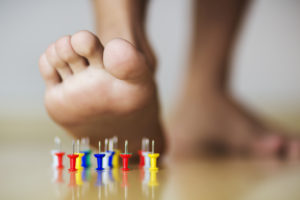Peripheral Neuropathy

Peripheral neuropathy is caused by damage to your peripheral nerves. This damage is often caused by the lack of blood supply and lack of nerve supply, which leads to symptoms such as burning, numbness tingling, poor circulation, cold hand and cold feet, weakness in muscles leading to balance problems or weak grip strength and pain, usually in your hands and feet. Research shows that regenerative medicine can help, as mesenchymal stem cells can help increase blood supply and nerve supply in the affected areas.
Causes of Neuropathy
The most common cause of neuropathy, by far, is diabetes. Here is why:
Nerves rely on tiny blood vessels to bring them highly oxygenated blood. All cells in our body, including nerves, need oxygen to stay healthy and stay alive. Without oxygen our nerves die. Diabetes is known to cause damage to blood vessels, with the smallest vessels being affected first. Damaged blood vessels result in a lack of blood supply. This is known as ischemia. The majority of people with diabetes have, or will develop neuropathy.
Chemotherapy is another common cause of neuropathy. Here is why:
Chemotherapy is often needed by patients battling cancer, as it kills cancer cells. Unfortunately, the chemotherapy is also toxic to healthy cells. As a result, it is common for nerves to be damaged by chemotherapy treatments. Sometimes the neuropathy caused by chemotherapy is self-limiting and the nerve can heal on its own over time. However, all too often the neuropathy caused by chemotherapy lingers and causes continued agony for the patient.
Nerve compression can also cause neuropathy. Here is how:
Nerve cells are long and very thin. Some nerve cells stretch the entire length of your leg, all the way down to your foot. That’s right, one cell can be 3-4 feet long! Nerves are made up of many cells wound together like strands in a rope. You can think of these tiny nerve cells as hollow tubes. Nutrients are moved through the hollow tube to keep each cell healthy. If there is some type of mechanical pressure placed on the nerve long term, it will restrict the flow of nutrients throughout the length of the nerve. This has the same effect as putting a kink in a garden hose- nothing is able to get through the tube. As a result, the nerve will become damaged and may eventually die. Some common causes of mechanical compression of a nerve are: a bulged/herniated disc in the lower back, muscle spasm in the buttocks, or legs, or a direct trauma to a nerve.
Vitamin B12 deficiency
Nerves need B12 to function normally. Without it they cannot function normally and neuropathy may result. This may happen as a result of alcoholism, or malnourishment.
Other Types of Neuropathy
There is also a type of neuropathy known as idiopathic neuropathy. This term literally means ‘you have nerve damage and we don’t know why’. This diagnosis is usually given when a medical history, examination, and testing fails to give an answer as to why the nerve damage is happening.
There are also other less common types of neuropathy. Some cases of neuropathy are related to autoimmune diseases like rheumatoid arthritis, Sjogren’s syndrome, or Guillain-Barre syndrome. Neurologic diseases, such as Multiple Sclerosis may lead to neuropathy. There are also several less common types of neuropathy related to genetic disorders.
Want to learn more about how American Wellness may be able to help you overcome neuropathy related issues? Please give us a call today to schedule your free consultation!
